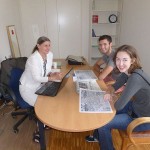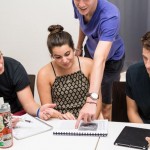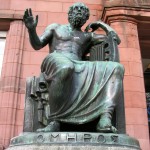Courses
During the winter and summer semester, AYF students enroll in a combination of specially-designed program courses offered exclusively to program participants and a variety of courses at the university and other local educational institutions.
 As an AYF student, you will put together a course of study in individual academic advising sessions with the Academic Director. Setting up your personal course of study allows you to explore your interests and challenge yourself academically while maintaining a manageable course load.
As an AYF student, you will put together a course of study in individual academic advising sessions with the Academic Director. Setting up your personal course of study allows you to explore your interests and challenge yourself academically while maintaining a manageable course load.
Courses taken as part of AYF transfer back as credits to our American partner universities and can keep you on track to graduate in four years!
Earn U.S. Credit
All approved courses taken with AYF will transfer back to American partner schools as credits. AYF students enroll in a minimum of 12 credits per semester to maintain full-time status at their home university while in Freiburg. AYF students generally earn 27-30 credits during their year in Freiburg.
„It was great having classes here that counted back home! And I loved the broad selection of language courses – AYF, PH, SLI, Uni courses … so many options!” – Brendan Ryan
Language Courses
Exclusively for AYF students, intensive language courses in Freiburg use text and media on current events in Germany to help students improve their German language skills rapidly. The focus of the orientation course is intensive language acquisition and includes a broad cultural introduction to the region as well. These custom-designed small classes are led by experienced instructors and students receive 3 credits for each of these courses.
Orientation Language Course (September)
The AYF language course held during Orientation is an intensive German composition and conversation course offered in groups based on proficiency level. A placement test is used to determine the appropriate level.
The course focuses equally on grammatical structures and practical application of functional vocabulary drawn from everyday life and a university setting. Classes meet five days a week for four units per day. Total number of teaching units in this class: 72 contact hours.
Advanced Language Course (October – December)
The so-called Aufbaukurse continue where the Orientation language courses left off. In ten weeks, from the middle of October until the third week of December, students continue to improve their German in these advanced composition and conversation courses.
Classes meet three days a week for two units per day. Total number of teaching units in this class: 60 contact hours.
By the end of December, AYF participants will have enjoyed more than 130 units of intensive German training offered by experienced and well-trained teachers.
AYF Topics Courses
 AYF offers two to three specially-designed topics courses each semester. These courses provide a broad survey of literary or historical periods or political science subjects and are taught in German by experienced local instructors and the Academic Director. Usually, two political science program course are offered in sequence: “Germany in the 21st Century” in the winter semester followed by a course on the European Union in the summer. A German history survey course with an integrated field trip to Berlin is offered each summer semester. Additional courses on German literature or film or sustainability questions are added as needed.
AYF offers two to three specially-designed topics courses each semester. These courses provide a broad survey of literary or historical periods or political science subjects and are taught in German by experienced local instructors and the Academic Director. Usually, two political science program course are offered in sequence: “Germany in the 21st Century” in the winter semester followed by a course on the European Union in the summer. A German history survey course with an integrated field trip to Berlin is offered each summer semester. Additional courses on German literature or film or sustainability questions are added as needed.
Playing with Texts: Kafka, Grimm, and the Tagesschau (Prof. Pia Banzhaf)
In this course students will stage various genres of literary German language texts as well as texts on current affairs in the medium of paper theater. Paper theater is an easily accessible, low-tech art form in which cut out figures help us act out the scripts. Imagine for example Kafka’s “Metamorphosis” performed in a tiny shoebox theater. This course offers a playful way to interpret texts and gain confidence in oral communication. No previous experience in the arts or theater is required.
Germany in the 21st Century: A Country Between Past, Present, and Future (Dr. Arndt Michael) – planned, tbc
The course deals with some of the most significant developments in modern Germany. The heart of the course is the analysis and discussion of Germany in the context of the recent events. In addition, the seminar will examine major political and socio-economic changes since 1989/90 and will progress through the period under its first female chancellor, Angela Merkel, to the current government under chancellor Olaf Scholz.
Students will be introduced to the German political and economic system, with a focus on the Germany party system as well as major policy areas that shape the role of today’s Germany. The course will also examine the growing influence of domestic and foreign policy challenges for Germany and its crucial role within the European Union. Current topics with attention to their historical and cultural background will also be dealt with, enabling the students to learn about the “new” role of Germany.
In general, students will develop both intercultural awareness and competence, including a deeper understanding of the history and political processes within Germany. The course aims to encourage the participants to think “outside of the box” and to analyze independently the substance, background and future of Germany, basing their judgments on academic debate, key documents, basic facts and first-hand reliable information sources, eventually being better to “understand” how Germany has attained its current position in Europe and the world.
Competence Workshop: Academic Reading, Writing, Presenting (N.N.) – planned, t.b.c.
In this workshop we will practice the key competences reading, writing and presenting that are essential for successful study – not only at a German university.
Together we will examine all stages of the academic writing process from understanding the task at hand, researching and evaluating available material, until we are ready to present a written product. By continually reflecting on their experiences with established reading and writing strategies, participants develop their personal „tool box“ for the remainder of their college education.
From Unification to Reunification: German History 1871 to 1990 (N.N.) – planned, t.b.c.
The years between 1871 and 1990 can be seen as one single era of German history. The founding of the German Empire in 1871 and the events of the years 1989/90 signal two different processes of unification as well as the beginning and the end of this era. A closer look at the intervening years, however, reveals a time of political, economical, and cultural change marked by serious political crisis and social conflict.
This course will offer an introduction to German history from the German Kaiserreich and First World War, through the Third Reich and divided Germany to unification in 1990. Special attention will be paid to the Kaiserreich and Weimar Republic. A closer knowledge of these periods of German history will enable us to understand the development of the Nazi dictatorship and the West and East German paths to democracy and communism, respectively, after 1945.
Internship Seminar (led by Prof. Pia Banzhaf, Academic Director)
This seminar is the academic component of the AYF Internship Program. The seminar responds flexibly to the particular internship placements held by students during a given summer semester, integrating student experiences into class discussions and presentations.
Intercultural issues, business communication, and gender issues in the work place provide additional focal points for class discussions. The course will be led by the Academic Director and may invite guest speaker(s).
Competence Workshop: Academic Reading, Writing, Presenting (N.N.) – depending on demand
In this workshop we will practice the key competences reading, writing and presenting that are essential for successful study – not only at a German university.
Together we will examine all stages of the academic writing process from understanding the task at hand, researching and evaluating available material, until we are ready to present a written product. By continually reflecting on their experiences with established reading and writing strategies, participants develop their personal „tool box“ for the remainder of their college education.
SLI Courses ~ Sprachlehrinstitut
The Sprachlehrinstitut (Language Teaching Institute) at Albert-Ludwigs-Universität offers a broad range of language and culture courses in the target language, generally at the intermediate level. In addition to German, more than 20 other languages are offered. SLI German courses are frequented by international students from around the globe, and the Sprachlehrinstitut also offers German culture courses specifically designed for international students.
Course offerings are listed in the SLI online course catalog every semester. However, while seminars in other departments often do not repeat (which is especially true in the humanities), the course lineup for SLI is quite stable. There is a very good chance, then, that SLI courses listed in the SLI Kurskatalog now will be offered again next year.
General information about SLI and its many other services and functions can be found on the Sprachlehrinstitut website.
Language and German culture course offerings (Landeskunde) well-suited to AYF students are listed in the section for Kurse für internationale Studierende aus Partnerprogrammen giving you a good idea of the kinds of courses that are typically offered.
PH Courses ~ Pädagogische Hochschule
AYF students are allowed to enroll in the local Pädagogische Hochschule (University of Education) as guests. The PH specializes in teacher training while offering academic courses in a variety of fields. Professors at the PH generally welcome AYF students into their classes. Many AYF students have found taking courses at the PH a very worthwhile part of their studies in Freiburg.
As is customary in Germany, the University of Education (PH) issues course catalogs on a semester basis. The so-called Vorlesungsverzeichnis differs from a U.S.-style course catalog in important ways. It always only lists the lecture courses, seminars, exercises, lab and discussion sections offered during a given semester.
When consulting the Vorlesungsverzeichnis, please keep in mind that you will be able to get a good feel for what kinds of courses are offered in a particular department, say German – but the courses offered during future semesters will be announced closer to your time in Freiburg.
How to Search for PH Courses
The course catalog (Vorlesungsverzeichnis) of the University of Education is organized in accordance with degree programs and their respective exam requirements (Prüfungsordnungen) and is fairly complicated for those not actually studying at the PH toward a specific degree.
However, you can find some good quick-and-easy strategies for gaining an overview of available course offerings and finding out more about specific courses. If you would like to get a first impression of the PH offerings before arriving in Freiburg, please see the user guide for the course catalog of the Pädagogische Hochschule Freiburg on our Guides & Information page.
University Courses ~ Albert-Ludwigs-Universität
 AYF students are enrolled as full-time, non-degree seeking students at Albert-Ludwigs-Universität Freiburg. When choosing courses, you are not limited to a particular department or set of departments. With very few exceptions (e.g. Medicine and Psychology), all fields of study are open to AYF students. From art history to zoology, you can choose courses from a wide range of humanities, social science and natural science departments and in formats ranging from large lecture courses to discussion-friendly seminars. The Academic Director will help you find courses that are right for you!
AYF students are enrolled as full-time, non-degree seeking students at Albert-Ludwigs-Universität Freiburg. When choosing courses, you are not limited to a particular department or set of departments. With very few exceptions (e.g. Medicine and Psychology), all fields of study are open to AYF students. From art history to zoology, you can choose courses from a wide range of humanities, social science and natural science departments and in formats ranging from large lecture courses to discussion-friendly seminars. The Academic Director will help you find courses that are right for you!
The university’s course catalog (Vorlesungsverzeichnis) is primarily designed for local students with specific degree requirements. For international students not limited to a particular degree program it can be hard to navigate. Various search functions are available, and we will discuss the best strategies for finding individual courses during orientation.
Once you are in Freiburg, the Academic Director will provide you with a list of Recommended Courses. It offers a more manageable selection of courses culled from all the institutions where you may take courses: Uni, PH, SLI, and AYF courses can all be found in this one handy list. You are by no means limited to the courses on the Recommended Courses list, but it will give you a good starting point for further explorations.
How to Search for University Courses
If you would like to get a first impression of the Vorlesungsverzeichnis before arriving in Freiburg, please see the “User Guide – Course Catalog Uni Freiburg” on our Guides & Information page. It outlines some good quick-and-easy strategies for gaining an overview of available course offerings and finding out more about specific courses.
Direct Links to Freiburg Course Listings
Freiburg University Course Listings / Albert-Ludwigs-Universität
Pädagogische Hochschule Freiburg Course Listings
AYF Internship Program
During the summer semester, you can participate in a credit-bearing internship and seminar. AYF students work part-time in a variety of local and regional institutions and businesses. A special Internship Seminar focusing on intercultural business communication complements and helps to contextualize the internship experience.
Read more on our Internship Program page.

